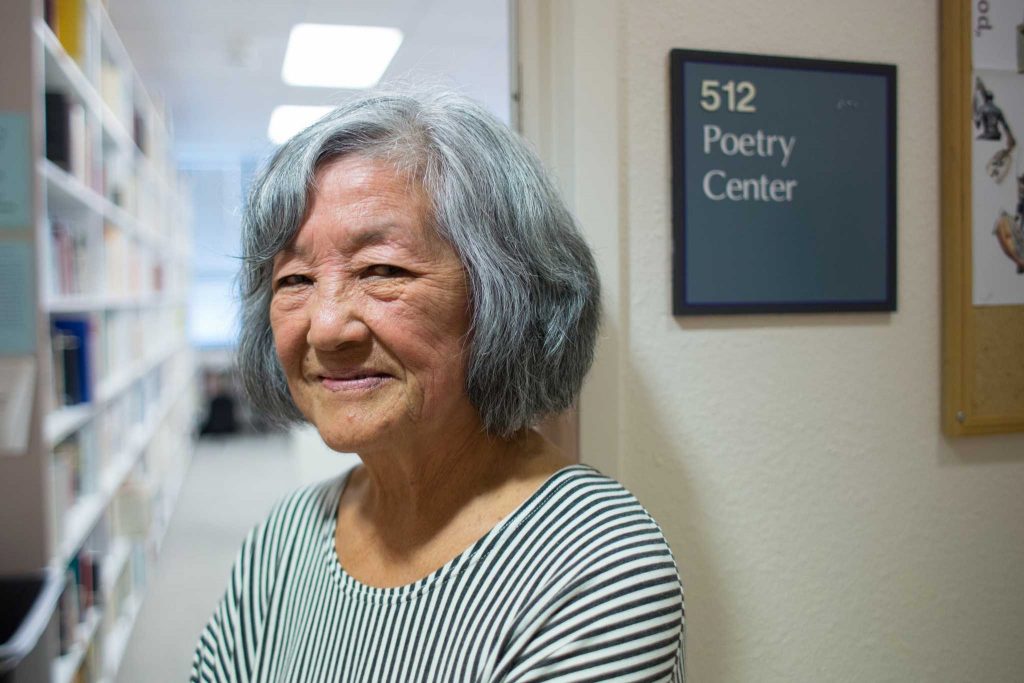Activism and creativity can blend to become both beautiful and haunting social commentary, which is no truer than in the poetry work of two SF State alumni.
Nellie Wong and Genny Lim are Bay Area natives who have promoted themes of equity and equality throughout their illustrious careers. They spoke at an Aug. 31 reading at SF State’s Poetry Center.
Roughly 25 students and faculty made up the attentive Thursday night crowd. Among them were creative writing major Aaron Matteucci and poetry major Vanessa Hamill.
“We do so much to dissociate ourselves from nature. I don’t think you can change human nature, but you shouldn’t stop trying,” Matteucci said about the confluence of poetry and activism.
Many of the poems revolve around the themes of political struggle, which spoke to Hamill. “They’re both really passionate about social justice. Poetry is activism,” she said.
Both Lim and Wong have multiple poetry collections published, spanning a few decades with their works. Only a few pieces of their works were shared during their 30 minutes of reading.
Wong read a poem entitled “Consumed,” which depicts the trampling of a black Wal-Mart employee in 2008. The poem repeatedly asks, “Who’s to blame?” and offers a few poignant answers such as, “The Dow down 680 points/The official U.S. in recession/The terrorists in Mumbai.”
One of the poems Lim read was entitled, “Soldier of Fortune,” which, according to her most recent collection, “Kra,” is dedicated to “Black Lives lost to police violence.” Its commentary on the violence is stinging and subversive with lines such as, “Don’t apologize for dying/Survival is only a bullet between freedom and exile.”

Lim and Wong have worked with each other before, and each woman has a deep respect for the other’s talent.
They’ve both been members of the writing collective Unbound Feet, which includes published authors Kitty Tsui, Canyon Sam, and Jade Cho.
“It was so emblematic of the oppression of Chinese American women,” Lim said regarding the collective’s title.
When speaking about the overall goal, both originally and now, of the writing group Lim said, “We really had a mandate and a mission to address sexual repression.”
Wong began writing poetry in her 30s while working as an office assistant and attending SF State classes at night.
She feels the activism in her writing comes “natural,” citing SF State as a helpful springboard:
“Certainly my being at SF State and taking poetry writing and courses in Asian American studies and feminism, etc. all kind of welled up into this not only enjoyment but the beauty and necessity of writing and using poetry as a way to express my thoughts, my views, anything personal and political as well,” Wong said.

She also said her budding career was aided by a gentle push from her friends at the time, who encouraged her to keep writing and sharing her poetry, even after one former SF State professor told her to just throw away the angry poems.
Wong points to SF State as the start of a more politically active stage in her life and, after taking a few courses about Asian American heritage and feminists movements, she began questioning minority inclusion. “I got interested in fighting for our rights,” said Wong. “Where are the women, where are there people of color?”
Lim was the youngest of six daughters in one of the first Chinese American families to live in North Beach.
She’s self-described as a “very political person” who has always had an acute awareness of racial issues. “From a very young age I was always aware of … very sensitive about issues of racism and oppression,” Lim said.
Out of her six siblings, only one was male, so she became “sharply aware” of the sexism in Chinese immigrant families. These astute observations eventually blossomed into the formalized activism she practices today.
“”It was just a matter of maturity that expanded that awareness into a more social political realm. These differences didn’t occur just within our family; it occurred in the neighborhood, it occurred in the community, in the city, and the city state,” Lim said.







